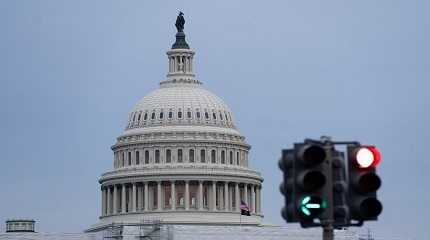
WASHINGTON, Dec. 24 (Xinhua) -- The U.S. Congress on Friday passed a bill with mammoth funding package to the White House despite criticism of high military spending and concern about inflation.
The bill, worth up to 1.7 trillion U.S. dollars, cleared the U.S. House of Representatives on Friday along party lines, a day after the Senate approved it.
U.S. President Joe Biden said on Friday that he "will sign it into law as soon as it reaches my desk."
Biden later signed a short-term funding bill into law to avert a partial government shutdown ahead of the midnight deadline.
The one-week continuing resolution has given more time for the spending bill, which runs more than 4,000 pages, to be processed for Biden's signature.
The massive spending package for fiscal year 2023 includes 772.5 billion dollars for non-defense, domestic programs, and 858 billion dollars in defense funding, nearly a 10-percent boost over the previous year.
It also provides about 45 billion dollars in emergency funding for Ukraine amid its ongoing conflicts with Russia.
The United States has been heavily criticized for hefty spending on military activities. In 2021, the U.S. military spending represented nearly 40 percent of the world's total, more than the next nine countries combined.
U.S. Congresswoman Alexandria Ocasio-Cortez from New York was the only House Democrat to vote against the government funding package on Friday, citing "the dramatic increase in defense spending" as a reason.
Stephen Semler, co-founder of a think tank named the Security Policy Reform Institute, said that 452 billion dollars of the newly-authorized defense spending "will be transferred to military contractors."
At least 20 members of the U.S. Congress or their spouses hold stock in top weapons contractors, according to an investigation published by the financial news website Insider.
Most House Republicans opposed the 1.7 trillion-dollar bill.
U.S. Congressman Randy Feenstra from Iowa on Friday called the bill a "monstrosity," which "continues Congress's sorry tradition of reckless spending and government waste."
U.S. Congressman Kevin Hern, an Oklahoma Republican, tweeted that Congress voting on spending so much taxpayer money "without members having sufficient time to even read the bill is exactly why Americans' trust in their government is so low."
Public trust in Congress reached an all-time low, with only 7 percent of Americans expressing "a great deal" or "quite a lot" of confidence in it, according to a Gallup poll released this summer.
Many members of the U.S. Congress also stressed stubborn inflation in the country while explaining their opposition to the sprawling omnibus that will fund the federal government through Sept. 30, 2023.
U.S. Senator Rick Scott, a Republican from Florida, said on Thursday that "this reckless inflation bomb is a disaster for our economy and a slap in the face to Floridians struggling to make ends meet."
"Inflation is ravaging the American Dream," U.S. Senator John Kennedy, a Louisiana Republican, tweeted. "We're not going to get control of it until Congress stops spending so much money."
The annual inflation rate for the United States is 7.1 percent for the 12 months ended November 2022, according to U.S. Labor Department data published earlier this month.
A majority of Americans -- 55 percent -- say rising prices have caused financial hardship for their household, a Gallup survey showed.




